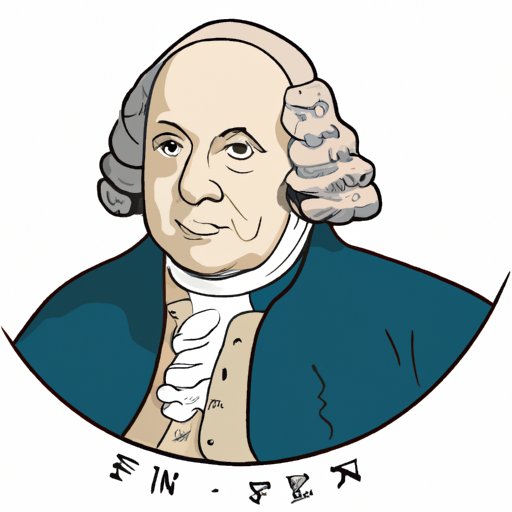I. Introduction
Benjamin Franklin is one of the most renowned figures in American history. A founding father, inventor, scientist, diplomat, and writer, Franklin made numerous contributions to American culture and society throughout his long life. In this article, we will explore his life, inventions, and legacy, discussing the ways in which Franklin shaped the United States of America and ultimately became one of the most influential figures in world history.
II. Overview of Benjamin Franklin’s Life
Born in Boston in 1706, Benjamin Franklin was the fifteenth of seventeen children. He began working as an apprentice in his brother’s print shop at the age of twelve, eventually starting his own printing business in Philadelphia. In addition to his work as a printer, Franklin was also an accomplished scientist, making significant discoveries in the fields of electricity and meteorology. Politically active throughout his life, Franklin served in the Pennsylvania Assembly and was a member of the Continental Congress during the American Revolution. He also served as a diplomat, representing the United States in France during and after the war.
Franklin’s most significant contributions to American history include his role in drafting the Declaration of Independence and his efforts to secure aid from France during the American Revolution. He also played a key role in the creation of several civic institutions, including the University of Pennsylvania and the American Philosophical Society. By the time of his death in 1790, Franklin was one of the most beloved and revered figures in the United States.
III. Benjamin Franklin’s Inventions and Discoveries
One of Franklin’s most famous inventions is the lightning rod, which he developed in the mid-18th century. Through a series of experiments, Franklin discovered that lightning was a form of electricity, and that a metal conductor could be used to protect buildings from lightning strikes. The invention of the lightning rod revolutionized building design, allowing for safer and more efficient construction methods. Franklin also invented bifocal glasses, which allowed people with both nearsightedness and farsightedness to see clearly.
Franklin’s inventions and discoveries had a profound impact on the scientific community of his time, and many of his ideas continue to be influential today.
IV. Benjamin Franklin’s Role in the American Revolution
As a member of the Continental Congress, Franklin was one of the primary architects of the American Revolution. He played a crucial role in securing aid from France, which proved instrumental in the eventual defeat of the British. Throughout the war, Franklin remained a passionate advocate for American independence, even as he negotiated with British officials in an attempt to find a peaceful resolution to the conflict.
Franklin’s contributions to the Revolutionary cause were not limited to his diplomatic efforts. He also helped to draft the Declaration of Independence, which laid out the principles of American freedom and democracy. Franklin’s commitment to these principles helped to inspire and guide the revolutionary movement, ensuring that the values of the United States of America would be founded on solid ground.
V. Benjamin Franklin as a Writer and Publisher
Throughout his life, Franklin was an avid writer and publisher. He was the founder and editor of the Pennsylvania Gazette, a widely-read newspaper that helped to shape public opinion in colonial America. Franklin was also the author of numerous works of prose and poetry, including the widely-read Poor Richard’s Almanack. His writing helped to establish the genre of the American political essay, and his contributions to the field of journalism continue to inspire writers and publishers today.
VI. Benjamin Franklin’s Legacy
Benjamin Franklin’s legacy is one of innovation, creativity, and civic responsibility. He was a man of many talents, and his contributions to the fields of science, diplomacy, and literature continue to be felt today. Perhaps most importantly, however, Franklin was a passionate advocate for freedom, democracy, and social justice. His ideas and innovations continue to inspire people around the world to work toward a better future, one that is founded on the principles of honesty, integrity, and human dignity.
VII. Conclusion
Benjamin Franklin was one of the most important figures in American history, a man whose contributions to science, politics, and literature continue to be felt today. His legacy is one of innovation, creativity, and social responsibility, and his ideas and inventions have helped to shape the world we live in. As we look to the future, it is important to remember the values that Benjamin Franklin stood for: freedom, democracy, and the pursuit of human dignity. By following in his footsteps, we can all do our part to create a better world for generations to come.
